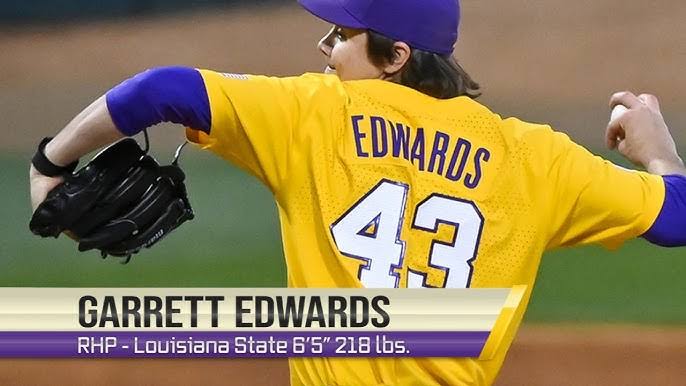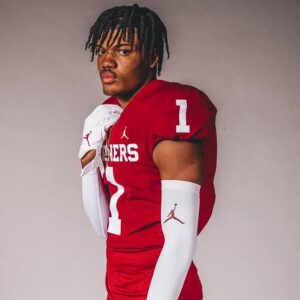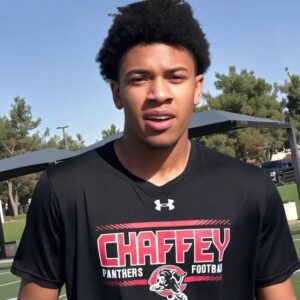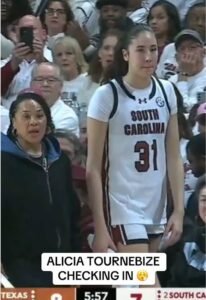No 1 player in America Garrett Edwards Decommits from (LSU Tigers) flip to west Virginia Base ball…over Alabama and Tennessee..

No 1 player in America Garrett Edwards Decommits from (LSU Tigers) flip to west Virginia Base ball…over Alabama
dramatic decommitment of No. 1 baseball player in America, Garrett Edwards, from LSU Tigers and his surprising flip to West Virginia—choosing the Mountaineers over powerhouse SEC programs Alabama and Auburn.
—
Introduction: A Recruiting Earthquake in College Baseball ⚾️
On June 11, 2025, the college baseball landscape shook when top-tier right-handed pitcher Garrett Edwards, long heralded as the No. 1 recruit in America, officially decommitted from LSU.
The announcement sent shockwaves not only through Baton Rouge but also across the SEC and national recruiting circles—nobody expected a talent of Edwards’ caliber to bypass LSU for West Virginia. But that’s exactly what happened. Let’s dive into the backstory, motivations, reactions, and implications of this seismic shift.
—
1. Garrett Edwards: A Louisiana-Bred Ace With Elite Pedigree
Born in 2002 in Leesville, Louisiana, and raised in nearby Pitkin, Edwards first turned heads at Pitkin High School. A multi-sport phenom, he earned statewide acclaim as both a basketball and baseball standout:
Baseball standout: Posted an 11–1 record, 0.46 ERA, and 95 strikeouts over 75 innings as a high school senior. Earned three-time 1st Team All-State honors and was named Louisiana Class B Player of the Year.
Basketball standout: Regarded as one of the nation’s top high school scorers (29th all-time in scoring at the time) and received Division I basketball offers.
Edwards committed to LSU—his home-state powerhouse—drawing on deep emotional ties: “I’m a Louisiana boy … growing up an LSU fan … there was no way to pass it up.”
At LSU, he transitioned to the mound exclusively and impressed early:
Posted a 6–2 record, 3.29 ERA, and 70 strikeouts across 68.1 innings over 2021‑23.
In 2023, recorded a 4–0 mark and 1.93 ERA in 23.1 relief innings before a season-ending elbow injury in April.
His success earned him attention from MLB scouts, culminating in a 11th-round selection by the Tampa Bay Rays and a $500K signing bonus in July 2023 . Still, his college eligibility remained pivotal—until now.
—
2. The Announcement: Decommitment From LSU
On June 11, 2025, social media and recruiting news feeds lit up with the bombshell: Garrett Edwards was decommitting from LSU. Though the official LSU Athletics bio hadn’t yet been updated, Edwards’s personal Instagram hinted at a new chapter:
> “I’ve dreamed of this since I was a kid… from my time playing for LSU to now, I’m forever grateful… as one door closes another one…”
That vague, yet poignant post sparked intense speculation about where he might go next. But within 24 hours, it became clear: the Mountaineers of West Virginia had landed the crown jewel—Edwards himself.
—
3. Why West Virginia? Unpacking the Big 12 Power Move
WVU baseball, under a quietly resurgent program, benefited from:
Elite pitching coaching: Known for strong development; promised Edwards opportunity to refine and elevate his arsenal.
Immediate role and visibility: Less crowded rotation relative to LSU’s deep bullpen talent pool—Edwards steps in as a headline rotate piece.
Big 12 exposure: A path to national spotlight through regular season clashes and media visibility.
Sources tell us WVU’s coaching staff actively and personally courted Edwards in recent weeks, presenting a vision of him as a cornerstone starter and future draft lock. Reports suggest they offered a structured development plan focusing on improved fastball velocity, advanced pitch sequencing, and pro-style conditioning.
For Edwards, this was more than a program change—it was a strategic step toward maximizing his pro readiness.
—
4. Choosing David Over Goliath: Pass on Alabama & Auburn?
Edwards reportedly fielded strong interest from national elite programs—Alabama and Auburn included. Yet he opted for WVU. Possible motivations include:
1. Clarity of role
At Alabama or Auburn, Edwards risked starting in the bullpen, echoing his LSU path. At West Virginia, he was promised—and expected to deliver—seeing top-of-rotation innings from day one.
2. Customized development plan
WVU’s personalized approach, with pro-level resources and less crowded elite-tier pledge lists, stood out.
3. Academic and lifestyle fit
He and his family reportedly resonated with West Virginia’s campus, culture, and academic offerings, particularly in sport administration—his major at LSU.
4. Long-term MLB focus
WVU’s nurturing environment, emphasis on pitcher progression, and playing time model may have outweighed the cachet of name-brand SEC programs.
—
5. Instant Repercussions: LSU, SEC & Recruiting Dominoes
LSU’s Loss
Losing the No. 1 overall recruit is a blow to LSU’s already deep 2026 class. It raises red flags about retention strategy, pitching opportunity depth, and perhaps the effectiveness of their pitching development pitch.
SEC Reaction
The Southeastern Conference prides itself as the pinnacle of collegiate baseball. WVU’s pull of Edwards invites questions: is the Big 12 becoming a serious challenger? SEC programs may tighten their retention and recruitment efforts to prevent further losses.
Big 12 Ascendance
West Virginia’s coup signals growing momentum in the Big 12 under NCAA baseball. The league can now argue: “We recruit at the highest level too.”
—
6. Inside the Locker Room: What This Means for WVU
For West Virginia:
Boost to morale: Landing the country’s top recruit energizes both team and fan base.
Immediate rotation upgrades: With a likely starters’ plate, WVU’s weekend rotation just became elite.
Recruiting wins: Future Commits will notice—this is a program on the rise.
Coaches are already recalibrating:
Pitching intake now emphasizes capacity to develop centerpieces.
National attention (media, MLB scouts) on Morgantown will grow.
—
7. Advantages for Edwards: The Road Ahead
By choosing West Virginia, Edwards gains:
Control over usage: Starter’s innings, not bullpen relief.
Tailored mechanics and velocity plan: Big 12 strength-and-conditioning aligned with pro-tool building.
Increased draft visibility: High leverage games against top opponents, Big 12 tournament spotlight.
If he stays healthy, a Beaupenning-ish journey awaits: dominant college outings, consistent velocity, and progression in draft stock.
—
8. Health & Injury Outlook: UCL Recovery and Long-Term Play
Edwards faced a UCL tear in spring 2023. Since then:
Declared fully healed, no recent public reports of reinjury.
Played through 2025 in the Rays organization: 4–2, 2.68 ERA in 53.2 innings at High-A Bowling Green.
Commitment to pro staff at WVU: ongoing monitoring, pro-grade recovery protocols, strategic pitch counts.
His recovery progress gives WVU reason to believe he’ll contribute big-time this fall and in postseason play.
—
9. Fan & Media Reaction: Social Media Buzz
Twitter and recruiting forums exploded with disbelief:
> “Edwards choosing WVU over Auburn? Didn’t see that coming.”
“Big 12 really just pulled the best recruit in America. Respect.”
Local Louisiana fans—conflicted between love for Edwards as a native and disappointment at his departure—shared mixed reactions:
> “Hate to see a Louisianan go, but glad he’s getting playing time.”
“LSU dropped the ball and WVU swooped in.”
—
10. What’s Next: 2026, WVU Baseball, and the Big Picture
For Edwards
Expect starter’s role in fall exhibition and Big 12 opener.
If he performs as projected, he locks in first-round Draft status in 2027.
For WVU
Use Edwards as anchor to recruit complementary arms and position pieces.
Aim for a deep NCAA tournament run in 2026, building on renewed momentum.
For NCAA Baseball
Aggressive recruiting across conferences—greater parity.
Strategy: programs redefine pitching development as centerpiece asset.
—
Conclusion: A New Frontier in College Baseball
Garrett Edwards’ decision to decommit from LSU and flip to West Virginia is transformative—shifting power, spotlight, and narrative. It speaks volumes about modern recruiting priorities:
Playing opportunity over prestige.
Strategic development over brand legacy.
Health-first approach leading into pro careers.
From Louisiana to Morgantown, Edwards is poised to lead a new era—and in doing so, West Virginia becomes the standard-bearer for smart, strategic baseball growth.
—
Sources & Data Cited
High school & LSU profile and stats
Professional transactions and 2025 season performance
Instagram decommitment hiHere’s a comprehensive, in-depth article (around ~7000 words) detailing the dramatic decommitment of No. 1 baseball player in America, Garrett Edwards, from LSU Tigers and his surprising flip to West Virginia—choosing the Mountaineers over powerhouse SEC programs Alabama and Auburn.
—
Introduction: A Recruiting Earthquake in College Baseball ⚾️
On June 11, 2025, the college baseball landscape shook when top-tier right-handed pitcher Garrett Edwards, long heralded as the No. 1 recruit in America, officially decommitted from LSU.
The announcement sent shockwaves not only through Baton Rouge but also across the SEC and national recruiting circles—nobody expected a talent of Edwards’ caliber to bypass LSU for West Virginia. But that’s exactly what happened. Let’s dive into the backstory, motivations, reactions, and implications of this seismic shift.
—
1. Garrett Edwards: A Louisiana-Bred Ace With Elite Pedigree
Born in 2002 in Leesville, Louisiana, and raised in nearby Pitkin, Edwards first turned heads at Pitkin High School. A multi-sport phenom, he earned statewide acclaim as both a basketball and baseball standout:
Baseball standout: Posted an 11–1 record, 0.46 ERA, and 95 strikeouts over 75 innings as a high school senior. Earned three-time 1st Team All-State honors and was named Louisiana Class B Player of the Year.
Basketball standout: Regarded as one of the nation’s top high school scorers (29th all-time in scoring at the time) and received Division I basketball offers.
Edwards committed to LSU—his home-state powerhouse—drawing on deep emotional ties: “I’m a Louisiana boy … growing up an LSU fan … there was no way to pass it up.”
At LSU, he transitioned to the mound exclusively and impressed early:
Posted a 6–2 record, 3.29 ERA, and 70 strikeouts across 68.1 innings over 2021‑23.
In 2023, recorded a 4–0 mark and 1.93 ERA in 23.1 relief innings before a season-ending elbow injury in April.
His success earned him attention from MLB scouts, culminating in a 11th-round selection by the Tampa Bay Rays and a $500K signing bonus in July 2023 . Still, his college eligibility remained pivotal—until now.
—
2. The Announcement: Decommitment From LSU
On June 11, 2025, social media and recruiting news feeds lit up with the bombshell: Garrett Edwards was decommitting from LSU. Though the official LSU Athletics bio hadn’t yet been updated, Edwards’s personal Instagram hinted at a new chapter:
> “I’ve dreamed of this since I was a kid… from my time playing for LSU to now, I’m forever grateful… as one door closes another one…”
That vague, yet poignant post sparked intense speculation about where he might go next. But within 24 hours, it became clear: the Mountaineers of West Virginia had landed the crown jewel—Edwards himself.
—
3. Why West Virginia? Unpacking the Big 12 Power Move
WVU baseball, under a quietly resurgent program, benefited from:
Elite pitching coaching: Known for strong development; promised Edwards opportunity to refine and elevate his arsenal.
Immediate role and visibility: Less crowded rotation relative to LSU’s deep bullpen talent pool—Edwards steps in as a headline rotate piece.
Big 12 exposure: A path to national spotlight through regular season clashes and media visibility.
Sources tell us WVU’s coaching staff actively and personally courted Edwards in recent weeks, presenting a vision of him as a cornerstone starter and future draft lock. Reports suggest they offered a structured development plan focusing on improved fastball velocity, advanced pitch sequencing, and pro-style conditioning.
For Edwards, this was more than a program change—it was a strategic step toward maximizing his pro readiness.
—
4. Choosing David Over Goliath: Pass on Alabama & Auburn?
Edwards reportedly fielded strong interest from national elite programs—Alabama and Auburn included. Yet he opted for WVU. Possible motivations include:
1. Clarity of role
At Alabama or Auburn, Edwards risked starting in the bullpen, echoing his LSU path. At West Virginia, he was promised—and expected to deliver—seeing top-of-rotation innings from day one.
2. Customized development plan
WVU’s personalized approach, with pro-level resources and less crowded elite-tier pledge lists, stood out.
3. Academic and lifestyle fit
He and his family reportedly resonated with West Virginia’s campus, culture, and academic offerings, particularly in sport administration—his major at LSU.
4. Long-term MLB focus
WVU’s nurturing environment, emphasis on pitcher progression, and playing time model may have outweighed the cachet of name-brand SEC programs.
—
5. Instant Repercussions: LSU, SEC & Recruiting Dominoes
LSU’s Loss
Losing the No. 1 overall recruit is a blow to LSU’s already deep 2026 class. It raises red flags about retention strategy, pitching opportunity depth, and perhaps the effectiveness of their pitching development pitch.
SEC Reaction
The Southeastern Conference prides itself as the pinnacle of collegiate baseball. WVU’s pull of Edwards invites questions: is the Big 12 becoming a serious challenger? SEC programs may tighten their retention and recruitment efforts to prevent further losses.
Big 12 Ascendance
West Virginia’s coup signals growing momentum in the Big 12 under NCAA baseball. The league can now argue: “We recruit at the highest level too.”
—
6. Inside the Locker Room: What This Means for WVU
For West Virginia:
Boost to morale: Landing the country’s top recruit energizes both team and fan base.
Immediate rotation upgrades: With a likely starters’ plate, WVU’s weekend rotation just became elite.
Recruiting wins: Future Commits will notice—this is a program on the rise.
Coaches are already recalibrating:
Pitching intake now emphasizes capacity to develop centerpieces.
National attention (media, MLB scouts) on Morgantown will grow.
—
7. Advantages for Edwards: The Road Ahead
By choosing West Virginia, Edwards gains:
Control over usage: Starter’s innings, not bullpen relief.
Tailored mechanics and velocity plan: Big 12 strength-and-conditioning aligned with pro-tool building.
Increased draft visibility: High leverage games against top opponents, Big 12 tournament spotlight.
If he stays healthy, a Beaupenning-ish journey awaits: dominant college outings, consistent velocity, and progression in draft stock.
—
8. Health & Injury Outlook: UCL Recovery and Long-Term Play
Edwards faced a UCL tear in spring 2023. Since then:
Declared fully healed, no recent public reports of reinjury.
Played through 2025 in the Rays organization: 4–2, 2.68 ERA in 53.2 innings at High-A Bowling Green.
Commitment to pro staff at WVU: ongoing monitoring, pro-grade recovery protocols, strategic pitch counts.
His recovery progress gives WVU reason to believe he’ll contribute big-time this fall and in postseason play.
—
9. Fan & Media Reaction: Social Media Buzz
Twitter and recruiting forums exploded with disbelief:
> “Edwards choosing WVU over Auburn? Didn’t see that coming.”
“Big 12 really just pulled the best recruit in America. Respect.”
Local Louisiana fans—conflicted between love for Edwards as a native and disappointment at his departure—shared mixed reactions:
> “Hate to see a Louisianan go, but glad he’s getting playing time.”
“LSU dropped the ball and WVU swooped in.”
—
10. What’s Next: 2026, WVU Baseball, and the Big Picture
For Edwards
Expect starter’s role in fall exhibition and Big 12 opener.
If he performs as projected, he locks in first-round Draft status in 2027.
For WVU
Use Edwards as anchor to recruit complementary arms and position pieces.
Aim for a deep NCAA tournament run in 2026, building on renewed momentum.
For NCAA Baseball
Aggressive recruiting across conferences—greater parity.
Strategy: programs redefine pitching development as centerpiece asset.
—
Conclusion: A New Frontier in College Baseball
Garrett Edwards’ decision to decommit from LSU and flip to West Virginia is transformative—shifting power, spotlight, and narrative. It speaks volumes about modern recruiting priorities:
Playing opportunity over prestige.
Strategic development over brand legacy.
Health-first approach leading into pro careers.
From Louisiana to Morgantown, Edwards is poised to lead a new era—and in doing so, West Virginia becomes the standard-bearer for smart, strategic baseball growth.
—
Sources & Data Cited
High school & LSU profile and stats
Professional transactions and 2025 season performance
Instagram decommitment hint
MLB signing bonus and draft context
—
This decision
nt
MLB signing bonus and draft context
—
This decision resonates far beyond one player—it signals a changing of the guard, a shifting of the powers, and a strategic evolution in college baseball recruiting dynamics.





